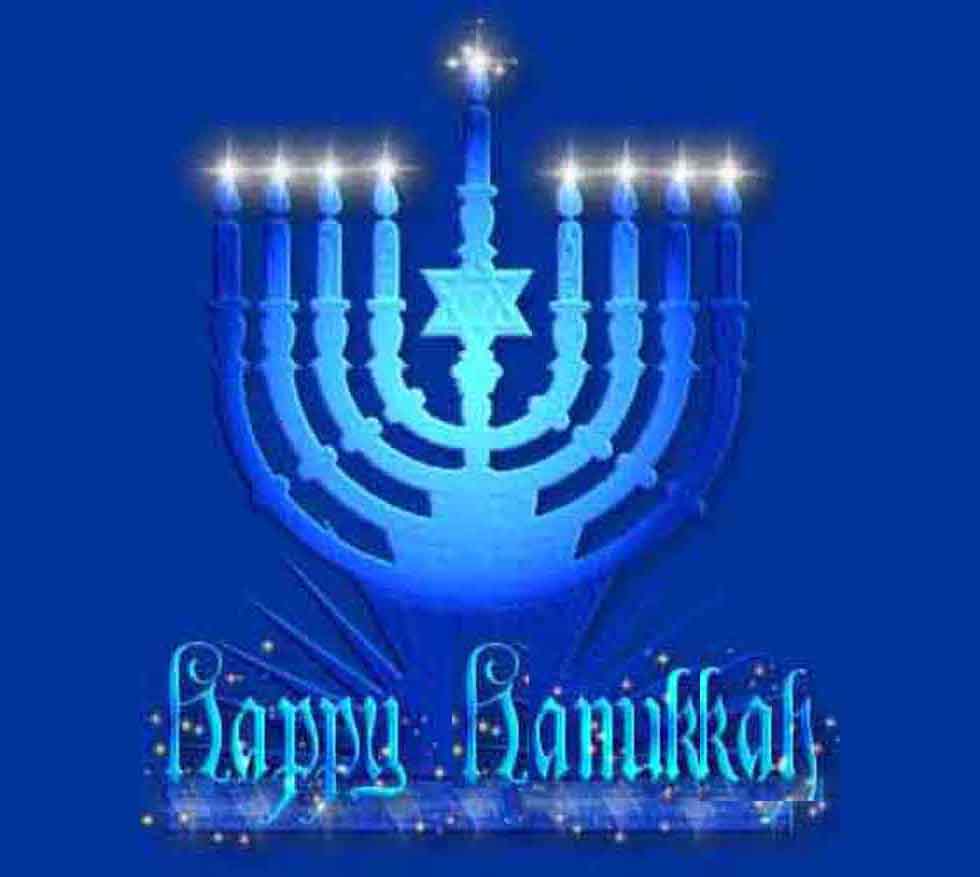

Hanukah is a Jewish holiday, also known as the Festival of lights. Hanukkah is a Hebrew word meaning "dedication". It also has other spellings in English, such as Hanukah.
Hanukkah begins on the 25th day of the Hebrew month of Kislev, and the holiday is celebrated for eight days. Since in Jewish tradition the Hebrew calendar date starts at sunset, the first evening of Hanukkah. starts after the sunset of the 24th of Kislev. This is usually the evening before the date shown for the first day of Hanukkah. on the Gregorian calendars that include it. The start of Hanukkah. usually falls in December but occasionally is in late November.
Always an important holiday to religious Jews, Hanukkah gained unusual importance with many assimilated secular Jewish families in twentieth century America, who did not consider themselves religious, yet wanted an alternative to Christmas celebrations that often coincide with Hanukkah. Hanukkah commemorates two main historical events:
2. The victory of the ancient Jewish Hasmoneans over the Seleucid Empire when Judah Maccabee and his brothers defeated overwhelming forces and rededicated the Temple in Jerusalem, almost two centuries before the common era. However, because Jews do not glorify war and because of Judaism's dislike for the Hasmonean later ungodly behavior, the holiday has never emphasized these military aspects but has concentrated on celebrating the rededication and the associated miracle of the Hanukah lights as described in the Talmud.
The festival is observed in Jewish homes by the kindling of special Hanukkah. lights on each of the festival's eight nights.
The story of Hanukkah is preserved in the books of 1 Maccabees and 2 Maccabees. These books are not part of the Hebrew Bible, but are part of the deuterocanonical historical and religious material preserved in the Septuagint; this material was not later codified by Jews as part of the Bible, but was so codified by Catholics and Eastern Orthodox. Another, probably later, source is the Megillat Antiokhos - a text ascribed to the Maccabees themselves by Saadia Gaon, but more likely written around the first or second century BCE.
The Maccabees were the leaders of a Jewish rebel army that took control of Judea, which had been a client state of the Seleucid Empire. They founded the Hasmonean dynasty, which ruled from 164 BCE to 63 BCE. They reasserted the Jewish religion, partly by forced conversion, expanded the boundaries of Judea by conquest and reduced the influence of Hellenism and Hellenistic Judaism.
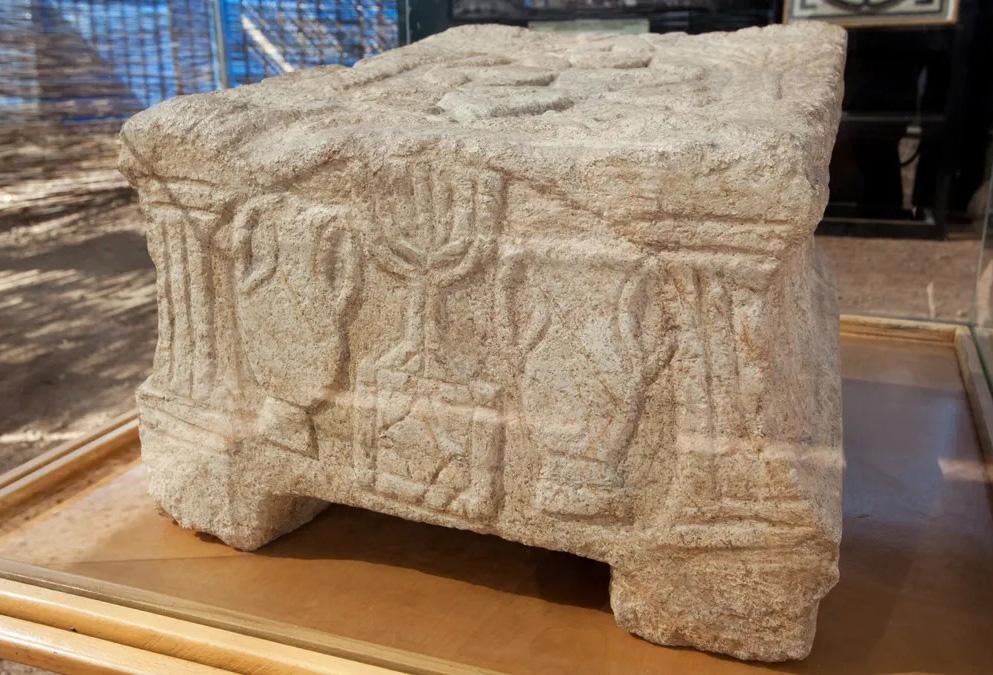
Magdala stone: 2,000-year-old carving from Jerusalem is world's oldest known depiction of a menorah Live Science - December 15, 2025
In 2009, Israeli archaeologists uncovered a massive stone in an ancient synagogue near the Sea of Galilee - and it had an ancient menorah carved into it. Only a handful of depictions of menorahs exist from the Second Temple period, which ended in A.D. 70 when the Romans destroyed both the temple and Jerusalem, and the Magdala stone may be the earliest of them all.
During an archaeological excavation ahead of construction, archaeologists discovered the ruins of a synagogue at the site of Magdala (also called Migdal), an ancient city said to be the birthplace of Mary Magdalen. The synagogue was in use from about A.D. 50 through its abandonment and collapse around A.D. 80.
Within a small room thought to have held Torah scrolls, archaeologists found a unique rectangular block of limestone set on four stone feet, now known as the Magdala stone. Five sides of the stone were decorated with raised carvings of objects in a synagogue. One of these carvings - a seven-branch menorah - has been the focus of much discussion since the stone's discovery.

The miracle of Hanukkah is referred to in the Talmud - a central text of Rabbinical Judaism - but not in the books of the Maccabees. The Gemara, in tractate Shabbat 21b, says that after the occupiers had been driven from the Temple, the Maccabees discovered that almost all of the ritual oil had been profaned. (They needed ritually purified olive oil to light a Menorah to rededicate the Temple.) They found only a single container that was still sealed by the High Priest, with enough oil for a single day.
They lit this, and miraculously, that oil burned for eight days (the time it took to have new oil pressed and made ready). A story similar in character, and obviously older in date, is the one alluded to in 2 Maccabees 1:18 et seq., according to which the relighting of the altar-fire by Nehemiah was due to a miracle which occurred on the twenty-fifth of Kislev, and which appears to be given as the reason for the selection of the same date for the rededication of the altar by Judah Maccabeus.
The Talmud presents three customs: lighting one light each night per household, one light each night for each member of the household, or, the most pious method, where the number of candles changed each night. There was a dispute over how the last option was to be performed: either display eight lamps on the first night of the festival, and reduce the number on each successive night; or begin with one lamp the first night, increasing the number till the eighth night.
The followers of Shammai favored the former custom; the followers of Hillel advocated the latter. As is the case in most such disputes, Jews today follow Hillel. Except in times of danger, the lights were to be placed outside one's door or in the window closest to the street. Josephus believed that the lights were symbolic of the liberty obtained by the Jews on the day that Hanukkah commemorates. Rashi, in a note to Shabbat 21b, says their purpose is to publicize the miracle.
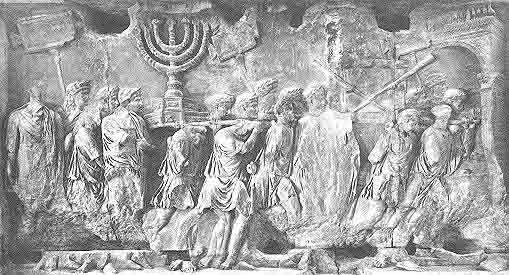
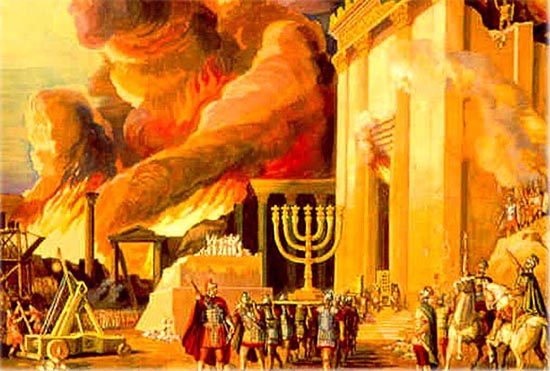
Around 200 BCE Jews lived as an autonomous people in the land of Israel, which at this time was controlled by the Seleucid King of Syria. The Jewish people paid taxes to Syria and accepted its legal authority, and by and large were free to follow their own faith, maintain their own jobs, and engage in trade.By 175 BCE Antiochus IV Epiphanes ascended to the Seleucid throne. At first little changed, but under his reign Jews were gradually forced to violate the precepts of their faith. Jews rebelled at having to do this. Under the reign of Antiochus IV, the Temple in Jerusalem was looted, Jews were massacred, and Judaism was effectively outlawed.
In 167 BCE Antiochus ordered an altar to Zeus erected in the Temple. Mattathias, a Jewish priest, and his five sons John, Simon, Eleazar, Jonathan, and Judah led a rebellion against Antiochus. Judah became known as Judah Maccabee (Judah The Hammer). By 166 BCE Mattathias had died, and Judah took his place as leader.
By 165 BCE the Jewish revolt against the Seleucid monarchy was successful. The Temple was liberated and rededicated.The festival of Hanukkah was instituted by Judah Maccabee and his brothers to celebrate this event. (1 Macc. iv. 59). After having recovered Jerusalem and the Temple, Judah ordered the Temple to be cleansed, a new altar to be built in place of the polluted one and new holy vessels to be made. When the fire had been kindled anew upon the altar and the lamps of the candlestick lit, the dedication of the altar was celebrated for eight days amid sacrifices and songs (1 Macc. iv. 36).
A number of historians believe that the reason for the eight day celebration was that the first Hanukkah was in effect a belated celebration of the festival of Sukkot, the Feast of Tabernacles (Macc. x. 6 and i. 9). During the war the Jews were not able to celebrate Sukkot properly. Sukkot also lasts for eight days, and was a holiday in which the lighting of lamps played a prominent part during the Second Temple period (Suk.v. 2-4). Lights were also kindled in the household, and the popular name of the festival was, therefore, according to Josephus the "Festival of Lights" ("And from that time to this we celebrate this festival, and call it Lights").
It has been noted that Jewish festivals are connected to the harvesting of the Biblical seven fruits which Israel was famed for. Pesach is a celebration of the barley harvest, Shavuot of the wheat, Sukkot of the figs, dates, pomegranates and grapes, and Hanukkah of the olives. The olive harvest is in November and olive oil would be ready in time for Hanukkah in December.
Hanukkah has relatively simple religious rituals that are performed during the eight nights and days of the holiday. Some aspects are practiced at home by the family, other aspects are communal. There are additions to the regular daily prayer services in the Siddur, the Jewish prayer book.
The primary ritual, according to Jewish law and custom, involves kindling an eight-branched candelabrum, known by different names. Ashkenazi (European Jews) have always referred to it as a Hanukkah menorah. Some Sephardi (Spanish and North African Jews) refer to the menorah as a "Hanukkah". Modern Israelis call it a "hanukiah". The reason for its use is not for the "lighting of the house within", but rather for the "illumination of the house without", so that passers-by should see it and be reminded of the holiday's miracle. Accordingly lamps are set up at a prominent window or near the door leading to the street. It is customary amongst some Ashkenazim to have a separate menorah for each family member (customs vary), whereas most Sephardim light one Hanukkah for the whole household.
Only when there was danger of anti-semitic persecution, as was the case in Persia under the rule of the fire-worshipers, or in Europe before and during World War II, were lamps supposed to be hidden indoors. As the lights were intended only for illumination in honor of the feast, reading by them was prohibited. A separate guard candle, or shammas, is lit first to prevent this. (as derived from the Talmud (Tracate Shabbat 21b-23a).
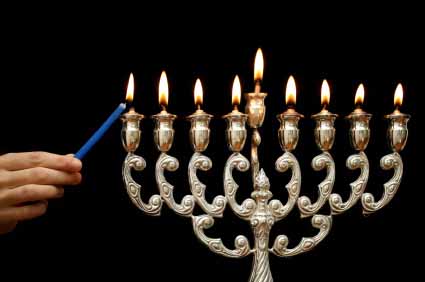
Recited all eight nights just prior to lighting the candles:
Translation: "Praised are You, Lord our God, King of the Universe, Who sanctified us with His commandments and commanded us to kindle the Hanukkah lights."
Recited all eight nights just prior to lighting the candles:
Translation: "Praised are You, Lord our God, King of the universe, Who performed wondrous deeds for our ancestors, in those days, at this season."
Recited only on the first night just prior to lighting the candles:
Translation: "Praised are You, Lord our God, King of the universe, Who has kept us in life, sustained us, and enabled us to reach this season."
When the lights are kindled the Hanerot Halalu prayer is subsequently recited:
Translation: "We light these lights For the miracles and the wonders, for the redemption and the battles that you made for our forefathers, in those days at this season, through your holy priests. During all eight days of Chanukah. these lights are sacred, and we are not permitted to make them serve except for to look at them in order to express thanks and praise to Your great Name for your miracles, Your wonders and Your salvations."
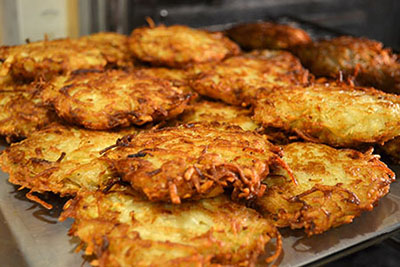
Latkes are potato pancakes traditionally eaten by Jews during Hanukkah. The oil for cooking the latkes is symbolic of the oil from the Chanukah story that kept the Second Temple of ancient Israel lit with a long-lasting flame that is celebrated as a miracle. Prior to the introduction of the potato to the Old World, latkes were, and in some places still are, made from a variety of other vegetables, cheeses, legumes, or starches, depending on the available local ingredients and foods of the various places where Jews lived. Despite the popularity of latkes and tradition of eating them during Hanukkah, they are hard to come by in stores or restaurants in Israel, having been largely replaced by the Hanukkah doughnut due to local economic factors, convenience and the influence of trade unions.
There is a custom to have Hanukkah parties and to eat foods fried or baked in some kind of kosher cooking oil, preferably olive oil, as the original miracle of the Hanukkah menorah involved the discovery of the small flask of oil used by the Jewish High Priest (the Kohen Gadol). Many Ashkenazi families make potato pancakes, known as latkes in Yiddish. Many Sephardim as well as Polish Ashkenazim and Israelis have the custom to eat all kinds of doughnuts (bimuelos or sufganiyot) which are deep-fried in kosher (mainly non animal-fat) oils. In America, some make a point of eating fried chicken and french fries on at least one of the eight nights of Hanukkah.
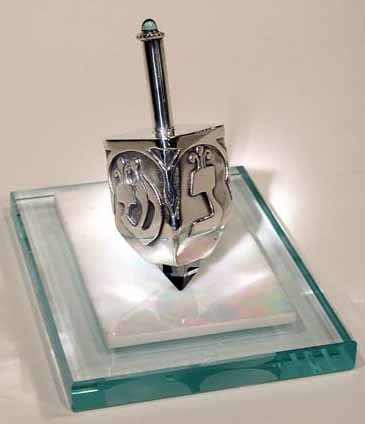
Dreidel
The dreidel (a four-sided "top") is associated with Hanukkah. It has four sides:
These letters also stand for the words Nes Gadol Haya Sham meaning "a great miracle happened there," or, without the nikkud (vowel marks).
The game may last until one person has won everything.
Hanukkah Gelt - ("Hanukkah. money") - is used as part of a game on the festival of Hanukkah. It is a term used for the money used in playing the game of dreidel. Traditionally, gelt came in the form of genuine coins, but most modern games are played using coins made of solid chocolate wrapped in gold-colored foil.The dreidel game involves placing gelt in a central "pot," spinning a four-sided top, and taking one of four actions (claiming the entire pot, claiming half the pot, doing nothing, or putting additional gelt into the pot) based on which side the top lands on.
I have a little dreidel
I made it out of clay
And when it's dry and ready
Then dreidel I shall play!
Oh - dreidel, dreidel, dreidel
I made it out of clay
And when it's dry and ready
Then dreidel I shall play!
It has a lovely body
With legs so short and thin
And when my dreidel's tired
It drops and then I win!
Oh - dreidel, dreidel, dreidel
I made it out of clay
And when it's dry and ready
Then dreidel I shall play!
My dreidel's always playful
It loves to dance and spin
A happy game of dreidel
Come play now, let's begin!
Oh - dreidel, dreidel, dreidel
I made it out of clay
And when it's dry and ready
Then dreidel I shall play!
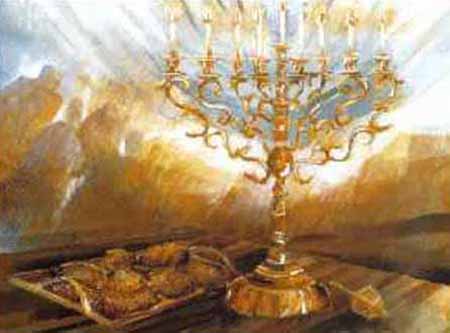
Oh Chanukah, Oh Chanukah
Come light the Menorah
Let's have a party
We'll all dance the Horah
Spin the whirling dreidels
All week long
Eating the sizzling latkes
Sing a happy song
Now light them tonight then
The candles all in a row
We tell the wondrous story of God in His glory
The wonders of long ago.